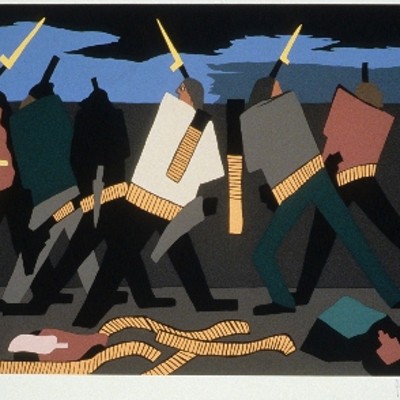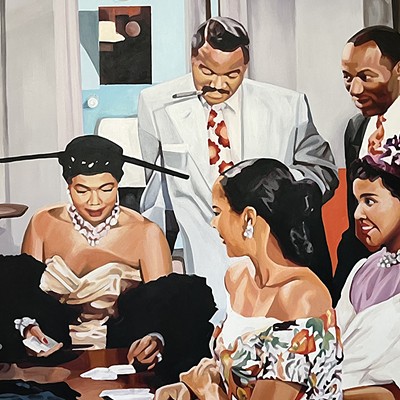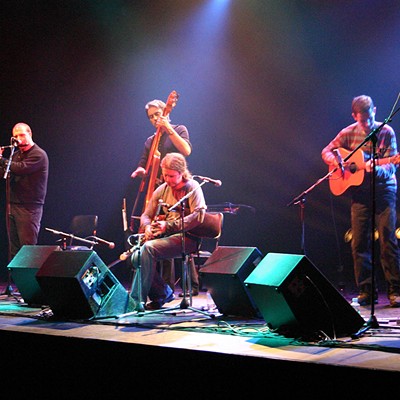Adapted excerpt from "Detained and Deported: Stories of Immigrant Families Under Fire" by Margaret Regan, published March 10, 2015, by Beacon Press. Read a Q&A with the author here.
© 2015 by Margaret Regan
Note: Yolanda's last name and the names of her family members have been changed for their privacy and protection. This story draws in part on Nina Rabin's "Victims or Criminals? Discretion, Sorting, and Bureaucratic Culture in the U.S. Immigration System," Southern California Review of Law and Social Justice 23 (2014): 195.
Yolanda Fontes sat in her prison scrubs and watched the families gathered all around her. Husbands were reconnecting with wives, sisters with sisters, mothers with children. It was a sunny Sunday in April, and the families had flocked to the Eloy Detention Center, a dreary for-profit immigration prison in rural Arizona, to visit their detained loved ones. A female prisoner sat with her small son on her lap, her arms wrapped tightly around him, as if she were imagining never letting him go. The aunt who had brought the little boy spoke sorrowfully to her sister as the child snuggled in his mother's embrace. Nearby, an imprisoned father sat across a table from his wife, clutching her hand. They were trying to talk, but their four-year-old daughter, hungry and tired, fussed on the floor below.
An impassive guard presided over these melancholy reunions, keeping a close watch on the mothers and fathers dressed in jailbird scrubs. The visiting room was bleak and windowless, lit by glaring prison lights. It was a beautiful spring day outside, but no rays of sunlight pierced the cinder block walls.
Alone among the detainees in this stark space, Yolanda had no family visiting. She was glad to be out of her prison unit, though, and she was determined to be cheerful. Yet her tale was grim, and she looked at the other detainees' kids wistfully as she recounted it. During the two years she'd spent locked up in Eloy, she'd seen her two little girls and her little boy only sporadically. The children, all American citizens, lived in a distant suburb northwest of Phoenix. They came to visit their mom only when a relative or friend could spare the time to drive the two-hundred-mile round trip to Eloy. The last time Yolanda had seen them was two months before.
Yolanda was thirty-two. She'd slipped into Arizona from Mexico seventeen years before, and she spoke flawless English. Even though she had no papers, she'd almost never had any difficulty finding a job. And until two years ago, she'd never had trouble with immigration. But the father of her two younger children regularly beat her, and one attack triggered a series of disasters that eventually landed her in jail and now detention.
The abusive ex had the two kids and Yolanda was facing deportation. She could have accepted "removal" to Mexico right away—and gotten out of Eloy—but if she were deported she would lose the children. So she stayed in the prison month after month, fighting her case, hoping to persuade a judge to overturn the deportation order, praying to get back to her daughters and her son.
Yolanda's spirits flagged just once during the two hours we talked. The last time the kids came to see her, she said, her five-year-old, Little V, had looked at her suspiciously.
"He told me I didn't look like his mother," she said, her eyes filling with tears. Her own child was starting to forget her.
Yolanda had come north at fifteen and settled in Phoenix. She'd found work easily, hiring on at restaurants and with a cleaning service, where she was so diligent that she was promoted to team supervisor.
"I know everything about chemical cleaners," she boasted.
At 22, she gave birth to her eldest, Janie; she met Victor later, and eventually had Madelyn and Little V with him. The violence began after Yolanda's niece Lalia came to live with the family. Victor started in on a secret affair with the teenager, and began hitting Yolanda and smacking the kids around. "He was very bad," Yolanda told me. "I will never forgive him."
The beatings escalated until the night that Victor nearly killed her. He squeezed her neck so hard he left a necklace of bruises on her flesh. Yolanda fled with the children. Little V and Madelyn were babies still, just one and two years old; Janie was five. Yolanda and the kids slept in her car for a while, and then they bounced around, sometimes alighting at a friend's place, sometimes at a shelter for battered women.
It was 2008. The economy had tanked, and for the first time Yolanda had trouble finding work. She got a tip on a job at a cleaning service, her specialty, only to learn too late that it was actually an "escort service," a brutal sex ring that had a sideline in drugs. Armed guards threatened to hurt the women if they resisted or called the cops.
Yolanda was so frightened she tried to quit. Then she started getting anonymous phone calls, threatening to harm her and the kids. In fear for her family's lives, Yolanda went back to work. After a police raid, though, Yolanda quit for good. Unbeknownst to her, the cops subsequently filed a warrant for her arrest and found her not long after.
She had gone to pick up Madelyn and Little V from a visit with their dad, but Victor and Lalia "were refusing to give my kids back," she said, and she called the cops for help. Officers came, but they looked up her warrant, cuffed her and took her to jail. She was charged with "illegally conducting an enterprise"—and her undocumented status was uncovered.
Undocumented immigrants accused of a crime in Arizona then were forbidden by state law to be released on bail (a federal court struck that ban down in October 2014), and Yolanda was held in a Maricopa County jail for two months before she had her hearing. She pled guilty; the judge gave her a suspended sentence and one year's probation.
An American citizen convicted of the same offense and given the same sentence would have walked out the courthouse door a free woman. But Yolanda was now officially a "criminal alien." She was facing deportation, and with a crime on her record she was subject to mandatory detention. An ICE agent took her straight to the notorious Eloy, third largest detention center in America.
When I first met Yolanda, on April Fools' Day 2012, she'd been locked up for two years.
"You lose interest in food and sleep," she confessed. "It's boring. You lose interest in everything."
To keep busy, she'd taken a job in the prison as a "porter," cleaning the in-house ICE offices and the courtrooms for a dollar a day. She liked getting out of her cell, but the job was also a strategy. She believed that if the judge saw what a hard worker she was, he might be more inclined to let her out on bond—and be with her kids—while she awaited news on her deportation appeal. So far, all the mopping and dusting had failed to persuade him.
She took pride in her mothering skills, and regularly made drawings to send to the kids. Once she'd even wangled permission to make them a microwave cake when they came for one of their rare visits.
"The last time I saw them was on the eighteenth of February," she said, her bravado faltering a little. Nor could she call them often. Prison phone calls were expensive, and she had little money.
With their mother effectively out of their lives, the children weren't doing all that well. Ten-year-old Janie lived with Yolanda's cousin Noemi. Noemi was kind—it was she who'd brought the children for that February visit—but Janie was "acting up," her mother said. "She's going down in her grades."
The younger two were living with Victor and Lalia. Yolanda hated that her niece was now the children's de facto stepmother. Seven-year-old Madelyn's health "was bad." She'd had a worrisome rash, and Yolanda didn't like the way her new "mom" fixed her hair, pulling it back so tightly it hurt. The baby of the family, six-year-old Little V, was having trouble in school and was going to have to repeat first grade.
She'd been told she was a flight risk if she were released on bond.
"But how does that make sense?" she said, beginning to cry. "I've been sitting in detention for two years so I can be with my children. Why would I leave them?"
Every day that Yolanda sat in Eloy, pining for her children, was a day that the Corrections Corporation of America got another $122.
CCA is the largest for-profit private prison corporation in the United States, and Eloy is just one of fourteen immigration detention centers that it runs for Uncle Sam. The work pays nicely. In 2012 alone, Yolanda and the other immigrants who ate the starchy meals and slept in the cramped cells in its many detention centers helped the corporation turn a profit of $206 million in its detention enterprises alone. CCA has a much larger business in for-profit criminal prisons, but the bull market in locking up immigrant mothers like Yolanda helped double its stock prices between 2010 and 2013.
The U.S. Congress has been more than helpful in furthering the private-prison-business boom. In 2004 the country had 18,000 detainee beds. Five years later, in 2009, lawmakers added the first-ever "bed mandate": ICE was now required to incarcerate no fewer than 33,400 detainees each and every day. In 2014, Congress tweaked the number up yet again, pushing the mandate to an even 34,000, most of them in for-profit prisons.
The bed bonanza doesn't come cheap. By 2013, the federal government was paying out $2 billion a year to detain the immigrants tossing and turning in those beds; the daily tab ran to $5.6 million. Immigrant advocates pleaded in vain for the nation to switch to cheaper—and more humane—techniques that would still guarantee that detainees like Yolanda showed up for their hearings. If she'd been allowed to go home to her kids in an ankle bracelet that kept track of her whereabouts, the feds would have shelled out a bargain $6 a day—the average cost of bracelet monitoring in 2012, the year I met her.
Bracelet monitoring can't match detention centers for corporate profits and job creation, though.
Eloy is one of many small towns across America that have learned to love private prisons. If cotton once was king in Eloy, now it's prisons that rule. CCA is the largest employer in Eloy (the company also runs three regular prisons in the town). The jobs are welcome in a remote town with few other work options. And the more immigrants who get locked up in the detention center, the more jobs there are, and the more money stands to be made by the CCA shareholders and executives—and the lawmakers they give donations to.
Detainees can hire an attorney to fight their immigration cases if they can scrape together the money, but most can't. And unlike criminal defendants, they don't have the right to a court-appointed attorney. Most represent themselves, struggling to make their way through the thickets of the law. After four months at Eloy, Yolanda had the extraordinary good luck to attract the attention of Nina Rabin, an attorney and law professor at the James E. Rogers College of Law at the UA.
Nina was highly attuned to the particular woes of female detainees and in 2010 she took on Yolanda's case pro bono, through the law school's immigration clinic. Ever since, she had been locked in combat with Yolanda's prosecutors from Immigration and Customs Enforcement (ICE).
Nina made the case that as an abuse victim Yolanda was entitled to relief from deportation under the Violence Against Women Act (VAWA). The ICE attorney argued right back that Yolanda's "crime of moral turpitude" – working in a sex ring -- made her unworthy of the VAWA dispensation.
After "five months, four hearings, and multiple briefs," as Nina later put it, a U.S. immigration judge at Eloy, James DeVitto, sided with ICE. Yolanda's crime made her ineligible for VAWA. Nina quickly appealed his decision, and simultaneously asked ICE to grant Yolanda "humanitarian parole" from Eloy while she awaited the final decision.
ICE's policy, enunciated in June 2010 by then-director John Morton, was to concentrate on deporting dangerous criminals and people who were risks to national security. Prosecutors were to give low priority to parents, like Yolanda, who were the primary caretakers of young children.
If ever there was a candidate for Morton's prosecutorial discretion, Nina argued, Yolanda was it. Her children were little; they were U.S. citizens; and they needed their mother. She was a victim of domestic violence, and two of the kids were in the care of the man who had abused her. She had committed no violence. She was most definitely not a flight risk.
ICE never responded to Nina's petition for humanitarian parole.
Eleven days after my April Fools' visit in 2012, Nina was racing up the highway to Eloy, en route to still another hearing. Law student Ben Harville was riding shotgun and I was in the backseat.
Nina's plan this time was to persuade DeVitto to use his power to bond Yolanda out while her VAWA appeal made its way up the legal chain. While she maneuvered the car up I-10, Nina tallied the points in Yolanda's favor.
"Her conviction is a direct result of the abuse she suffered," she said. "She was kicked out of the house. The people she was working for are connected to drug cartels. They threatened her and her kids when she tried to leave. She deeply regrets doing it and she has paid dearly for it." And at Eloy, "she has been nothing but a model detainee."
Nina plotted tactics with Ben. "You need to say: There are serious humanitarian issues. She's been separated from her three children. She was the primary caregiver. The children need her back in their lives."
When we arrived at the in-house courtroom inside Eloy, another hearing was under way. A woman in blue scrubs sat alone, huddled in a chair. She was representing herself and struggling to understand the proceedings. An interpreter translated into Spanish as Judge DeVitto explained to the detainee that he had some legal papers for her—in English. He ordered a stay, so she could get the papers translated, and she shuffled out, looking hopeless and scared.
Yolanda was next up. The battling attorneys sat on opposite sides of the courtroom —Nina and Ben on the left, the ICE prosecutor on the right. Ben stood up and pleaded with the judge to let this mother go home to her children. She had a place to live, with her cousin. She was a victim of domestic violence. And she had already been incarcerated, two years to the day.
The ICE attorney argued back hard, returning again and again to Yolanda's crime of "moral turpitude." Judge DeVitto slumped over, head in his hands, the very picture of a world-weary observer who already had seen far too much human tragedy in his courtroom.
He looked up and raised his eyebrows. "And what was the sentence for this 'crime involving moral turpitude'?" he asked, sarcasm giving an edge to his voice.
There was only one answer possible. "A year of probation," the attorney replied sheepishly.
Judge DeVitto parroted his response. "A year of probation." Then he issued his decision. He'd found a loophole. The state prosecutors had charged Yolanda not with prostitution per se, but with "facilitation to commit/illegally conducting an enterprise," apparently in an effort to cast her as a leader of the sex ring.
Judge DeVitto declared that the vague "facilitation" was not a crime of moral turpitude.
Yolanda could go free to await her appeal.
She had to pay a $5,000 bond. It was a stiff penalty, and Yolanda would have to raise it from family and friends, but Nina knew that with the criminal conviction, that was as low as the judge would go. Yolanda had a whispered conference with the attorneys, then gave her assent.
The next morning she went home to her kids.
Nina was still worried. The ICE prosecutor immediately appealed the judge's bond decision. If he won that round, Yolanda could be hauled back to Eloy. And she might still lose her VAWA appeal.
Nina began to see her way to make a different case. She had learned more about Yolanda's "crime" in the last months, and the fact was that Yolanda had been coerced into prostitution, by criminals who had threatened her and her children. She should be eligible for a T visa, which by federal law could be awarded to victims of "sex trafficking in which a commercial sex act is induced by force, fraud or coercion."
Nina filed the T visa application to another federal agency, U.S. Citizenship and Immigration Services.
Months later, a decision came down. USCIS rules that Yolanda had indeed been forced into the sex industry by human traffickers. She could have her T visa. She could stay in the United States permanently. She would not be going back to Eloy, ever.
Nina was struck by the contrast between the two federal agencies deciding Yolanda's fate.
"ICE saw her as a criminal," Nina said. "And the CIS saw her as a victim."
If Nina hadn't come along with her free legal help, there was no telling where Yolanda would be now. Still locked up in Eloy, maybe, like that other woman we saw in court, with the rest of the detainees who have no lawyers. Or she'd be in Mexico, a deportee living in a country she hardly knew. In either case, she wouldn't be raising her children.
Now she was. She was home, back with Janie, Madelyn, and Little V, loving them and scolding them and singing them to sleep, making sure they did their homework, dabbing salve on their rashes, and fixing their hair exactly the way she pleased.











